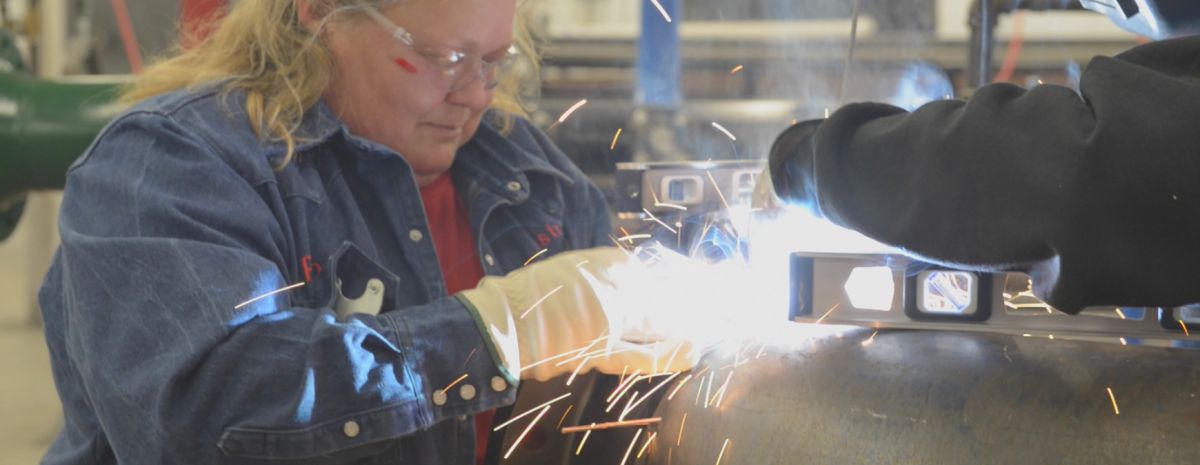TWS is a Great Training Option for Everyone
Learn more about how we can prepare you to advance your career.
Pipefitters play an important role in society. They’re the skilled trades workers who install and maintain pipes that carry chemicals, acids and gases in manufacturing, commercial and industrial settings.1
If you’re considering enrolling in a pipefitter training program, you may be wondering where you could work upon graduation in 2021 or later.
The Bureau of Labor Statistics’ occupational information can help give you an idea of where pipefitters might expect to work.2
So let’s dive into the data!
Have You Considered a Career in the Skilled Trades?
Fill out the form to recieve a no obligation info packet.
3 Pipefitter Industries to Consider in 2021
The following 3 industries employed the most pipefitters in 2019, the most recent year that data is available.2
Keep in mind, the following industries are categorized under “wage and salary employment” by the BLS.2 Most pipefitters work as wage or salary employees. It’s also possible to be a self-employed pipefitter2.
1. Construction
The construction industry employs the most number of pipefitters, by far. A main part of a pipefitter’s job is to install pipes and fixtures in industrial and commercial settings, so it would make sense that a large majority of pipefitters are construction workers.1
For example, a construction job site for an industrial plant water system might consist of various different skilled laborers.2 A crew of pipefitters would be the team responsible for installing the large steel pipes that might carry the plant’s water, gas and other liquids.2
Most pipefitters who work in construction are considered “specialty trade contractors,” which means they are responsible for a specific activity during construction—in this case laying and fitting pipe, but are not responsible for the entire project.2,3
Pipefitters may be tasked with any part of the construction process, from performing new work, making alterations or performing maintenance or repairs.3
Future opening in pipefitting jobs are expected to come from workers exiting the workforce, either to pursue different occupations or retire.4
2. Manufacturing
The movement of liquids and gases through industrial pipes is essential to the functioning of modern society, such as in manufacturing new products. In manufacturing, chemicals need to be moved around the facility to aid in product creation. Pipefitters install, maintain and repair the critical piping systems that aid in consumer product manufacturing.5
The installation, maintenance or repair of high-pressure and low-pressure piping systems may be among the projects pipefitters work on. These piping systems might also play a role in the generation of electricity, including the heating and cooling of buildings.6
3. Government
The third industry that employed the most pipefitters in 2019, not including those who were self-employed, was the government.2
Government also employees pipefitters. Pipefitters may be employed at the federal, state or local level to perform pipefitting duties, such as installation, maintenance and repair of high-pressure piping systems.7,8
Here are three agencies that hired pipefitters in 2018: the Veterans Health Administration, the U.S. Coast Guard and the Bureau of Prisons/Federal Prison System.8
Pipefitting: An Essential Industry

Beyond this shortlist, pipefitters may work in a variety of other industries, such as:
- Mining
- Waste management
- Healthcare
- Transportation
- Warehousing
- Wholesale trade
- Retail
- Utilities2
Despite fluctuations in the economy, pipefitting could be considered a relatively stable industry. Even in economic downturns, our society still relies on the transportation of liquids, gases and chemicals through industrial piping systems. Pipefitters perform the essential duty of maintaining and repairing these systems.4
The potential for job security is just one of the many reasons to consider a pipefitter career.
1https://www.bls.gov/ooh/construction-and-extraction/plumbers-pipefitters-and-steamfitters.htm#tab-2
2https://data.bls.gov/projections/nationalMatrix?queryParams=47-2152&ioType=o
3https://www.bls.gov/iag/tgs/iag238.htm
4https://www.bls.gov/ooh/construction-and-extraction/plumbers-pipefitters-and-steamfitters.htm#tab-6
5https://collegegrad.com/careers/plumbers-pipefitters-and-steamfitters
6https://studentscholarships.org/salary/410/plumbers_pipelayers_pipefitters_and_steamfitters.php
7https://ptt.edu/blog/industries-a-plumber-or-a-pipefitter-can-work-in/
8https://www.federalpay.org/employees/occupations/pipefitting
This blog has been labeled as archived as it may no longer contain the most up-to-date data. For a list of all current blog posts, please visit our blog homepage at https://www.tws.edu/blog/







